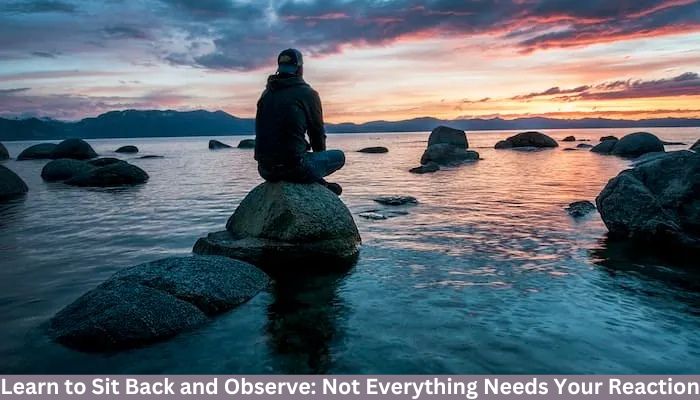Have you ever noticed how much power we waste reacting to every little component? Whether it’s a snarky comment, an unexpected event, or maybe an email that incorrectly rubs you, we often feel compelled to reply instantly. But what if you didn’t? What if you just sat back and observed instead?
Let’s explore why gaining knowledge of the art of observation is one of the most transformative abilities you can broaden.
The Power of Silence and Observation
Why Silence Is a Strength
Silence isn’t a weakness; it’s information. When you live silently, you advantage of time to suppose and mirror. This pause lets in you to reply thoughtfully in preference to swiftly.
Observation as a Tool for Understanding
Observation facilitates you to see past the obvious. It’s no longer pretty much what people say however how they say it. Their frame language, tone, and expressions regularly reveal more than phrases ever could.
Understanding Human Behavior Through Observation
How People Reveal Themselves Without Words
Actions talk louder than phrases. By gazing closely, you may apprehend motivations, fears, and dreams without absolutely everyone explicitly telling you.
Recognizing Patterns in Communication
People are predictable. By paying attention, you can notice patterns in how they react to pressure, pleasure, or struggle, providing you with a deeper perception of their character.
The Psychology Behind Overreacting
What Drives Immediate Reactions
Immediate reactions often stem from worry, insecurity, or anger. Recognizing those triggers is step one to breaking the cycle.
The Emotional Toll of Constant Reactions
Reacting to the entirety drains your mental and emotional assets. It can result in anxiety, burnout, and strained relationships.
Benefits of Sitting Back and Observing
Gaining Clarity and Perspective
Observation permits you to step again and see the bigger photo. What seemed like a large deal often seems to be insignificant upon mirrored image.
Strengthening Relationships
By looking at it, you show respect for others’ perspectives. This fosters acceptance as true with deeper connections.
How to Develop the Habit of Observation
Practicing Mindfulness
Mindfulness trains your mind to cognizance of the prevailing second. The more gifts you have, the higher you may observe.
Setting Intentional Pauses in Conversations
Take a breath earlier than responding. This small act could make a large difference in the fine of your interactions.
Situations Where Observation Is Key
Conflict Resolution
Jumping to conclusions escalates conflicts. Observing first facilitates you to approach disputes with calm and clarity.
Professional Environments
In the place of business, commentary enables you to understand workplace dynamics and make better choices.
Observation in Personal Growth
Learning from Others’ Experiences
You don’t want to make each mistake yourself. Observing how others manage demanding situations can give you valuable training.
Reflecting on Your Behavior
Observation isn’t simply outward-facing. It’s also about searching inward and knowing your reactions and habits.
Why Reacting to Everything Is Exhausting
Mental Energy and Emotional Stability
Reacting continuously puts you in a state of emotional overdrive, leaving little room for peace.
The Trap of Overanalyzing
While observation is valuable, overthinking may be counterproductive. Striking stability is key.
The Role of Patience in Observation
Building Patience as a Skill
Patience is a muscle you may train. Start small with the aid of ready some seconds earlier than responding to minor annoyances.
The Long-Term Rewards of Restraint
Patience brings clarity, better decisions, and lasting peace.
Observation in Social Media Age
How to Filter the Noise Online
Social media is a hotbed of impulsive reactions. Take a step returned and suppose before you type.
Avoiding Impulsive Digital Reactions
A delayed reaction—or none at all—can prevent pointless drama.
Conclusion
Learning to take a seat return and examine isn’t pretty much keeping off useless reactions. It’s approximately embracing a calmer, extra considerate way of dwelling. When you forestall reacting to each little component, you unfastened up strength for what matters. So, the following time existence throws something unexpected your way, take a deep breath, sit again, and examine.
FAQs
Q1. How does watching enhance choice-making?
Observation gives you a clearer expertise of situations, enabling you to make informed, rational decisions.
Q2. Can remark replace energetic communique?
Not absolutely. Observation enhances conversation by means of supporting your reply thoughtfully in preference to all of a sudden.
Q3. What are a few daily behaviors to come to be greater observant?
Practice mindfulness, take intentional pauses, and recognize listening more than speaking.
Q4. How do I avoid overthinking at the same time as looking at it?
Set boundaries for the way you’ll mirror a situation and focus on actionable insights in preference to the dwelling.
Q5. Why is a statement so critical in relationships?
It allows you to understand your accomplice’s wishes, feelings, and behaviors, main to healthier and extra-empathetic connections.

